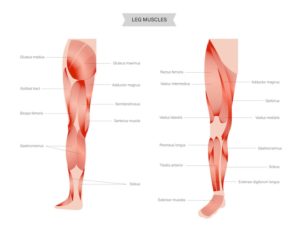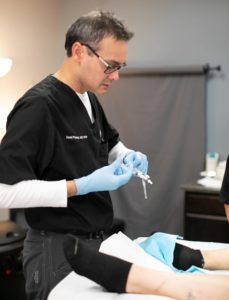| The soleus muscle, often dubbed “the second heart,” plays a pivotal role in maintaining healthy circulation and preventing venous issues like varicose veins. By incorporating targeted exercises to strengthen the soleus muscle and adopting simple lifestyle changes to promote movement, individuals can support vein health and reduce the risk of related complications. To learn more about optimizing vein health and exploring personalized interventions, schedule a consultation with Artemis Vein Center today for expert guidance and comprehensive care. |

One small but powerful muscle has a big impact on vein health. The soleus muscle runs down the back of the leg from the knee to the Achilles tendon, and lies underneath the gastrocnemius muscle. These two muscles are what we normally think of as the “calf.”
The soleus is also referred to as “the second heart” because of its role in returning blood up from the legs, a crucial part of healthy circulation. Modern life often makes us sit for too long. Whether we’re at work or watching television in our favorite chair at home, we’re not moving our soleus muscle. This can result in swelling, painful joints, cramping, and the formation of varicose veins.
Our veins return blood and fluid to our heart, and the veins in the legs have to fight constantly against gravity. To keep things moving in the right direction, veins have one-way valves that prevent blood from flowing back down toward our feet.
Also, veins are typically located in our muscles, so any movement in those muscles helps force the fluid back up. When our legs are too inactive, however, the blood can pool in our veins, which stretches the vein walls and causes reverse blood flow. Over time, reverse blood flow stretches the vein walls and contributes to the formation of varicose veins.
Fortunately, you don’t have to change your lifestyle to improve the health of your soleus muscle! The soleus is the muscle that enables us to point our toes when our knees are bent, which means that you can get in a little soleus workout while sitting at your desk or at home by doing a seated calf raise. Consult your personal physician before trying this exercise to determine if it is appropriate for you.

This exercise targets your soleus muscle. Other calf-strengthening exercises, such as standing calf raises, will also engage the soleus, but the gastrocnemius is doing the majority of the work in these movements. Pointing your toes while your legs are at a 90-degree angle will isolate the soleus muscle, helping to strengthen it, pump your blood back up to the heart and maintain healthy veins.
Incorporating movement into your daily routine is essential for promoting vein health and overall well-being.
Here are some practical tips to help you stay active throughout the day:
By incorporating these simple strategies into your daily life, you can support the health of your veins and reduce the risk of venous issues associated with prolonged periods of inactivity.
Other exercises that improve cardiovascular health while engaging your leg muscles can also keep your veins healthy. These exercises don’t have to be extreme or high-impact! One of the best approaches to overall health is to establish a consistent walking routine, where you walk 30 minutes a day for 4-5 days a week.
If you don’t already have an exercise routine, start slowly! Set a goal to walk just a short distance once or twice per week. As you feel stronger, you can increase this amount gradually, and soon you may find yourself enjoying exercise most days of the week. Speak with your doctor for help designing a workout routine tailored for your needs, especially if you already have varicose veins or other vein issues.
If you would like to speak with an expert about leg pain, swelling, spider veins, or varicose veins, make an appointment at Artemis Vein Center for a complimentary informational visit.
The trained specialists at Artemis can assess your vein health, diagnose any issues, and suggest interventions that can help relieve pain and improve the appearance of your legs if you are already suffering from venous insufficiency. Treatments are non-invasive and completely painless, or minimally-invasive with almost no discomfort. It’s never too late to take the first step toward healthier living!
Schedule an appointment at our Westminster office.